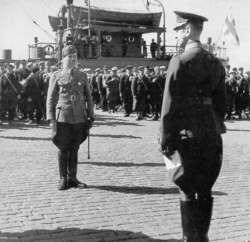Finland–Hungary relations: Difference between revisions
TimothyBlue (talk | contribs) Reverted 1 edit by 195.174.125.158 (talk) |
No edit summary |
||
| Line 1: | Line 1: | ||
{{bilateral|Finnish-Hungarian|Finland|Hungary}} |
{{bilateral|Finnish-Hungarian|Finland|Hungary}} |
||
'''Finnish-Hungarian relations''' are foreign relations between [[Finland]] and [[Hungary]]. Both countries are members of the [[European Union]], [[Council of Europe]] and the [[Organization for Security and Co-operation in Europe]]. Both people’s language are part of the [[ |
'''Finnish-Hungarian relations''' are foreign relations between [[Finland]] and [[Hungary]]. Both countries are members of the [[European Union]], [[Council of Europe]] and the [[Organization for Security and Co-operation in Europe]]. Both people’s language are part of the [[Uralic languages|Uralic language]] family. |
||
== History == |
== History == |
||
Revision as of 04:38, 13 March 2023
 | |
Finland |
Hungary |
|---|---|
Finnish-Hungarian relations are foreign relations between Finland and Hungary. Both countries are members of the European Union, Council of Europe and the Organization for Security and Co-operation in Europe. Both people’s language are part of the Uralic language family.
History
Before independence
At the end of the 19th century the Finno-Ugric linguistic affinity became widely accepted after extensive public debate.
Independence
Hungary recognized Finland on August 23, 1920. Finland recognised Hungary on September 10, 1920.
World War II


When the Winter War broke out between Finland and the Soviet Union, many Hungarians felt great sympathy towards the Finns and wanted to help them.[1]
The Hungarian government officially did not support Finland, but secretly started searching for ways of helping.[2] In addition, non-governmental organisations began to organize support for Finland. Hungary helped Finland by giving monetary donations, armaments and military volunteers.
After the loss of Continuation War, Finland discontinued diplomatic relations on September 20, 1944.[3]
Post World War II
This section needs expansion. You can help by adding to it. (April 2022) |
Diplomatic relations were re-established on May 20, 1947. Finland has an embassy in Budapest and an honorary consulate in Pécs. Hungary has an embassy in Helsinki and 4 honorary consulates (in Turku, Mariehamn, Tampere and Joensuu). Both countries are full members of the European Union.
See also
References
- ^ Ruprecht Antal: Magyar önkéntesek a Téli háborúban – Unkarilaiset Vapaaehtoiset Talvisodassa; Hadtörténeti Intézet és Múzeum, Budapest, 2003. pp. 9-11.
- ^ Ruprecht Antal: Magyar önkéntesek a Téli háborúban – Unkarilaiset Vapaaehtoiset Talvisodassa; Hadtörténeti Intézet és Múzeum, Budapest, 2003. pp. 9-11., 23-25., 91.
- ^ "Unkari: Suomi ja Unkari: Diplomaattisuhteiden historia". Suomi ulkomailla (in Finnish). Retrieved 15 February 2023.

